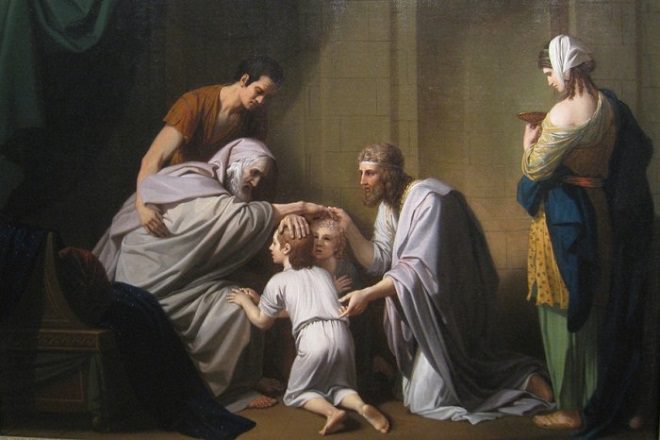From Genesis 48-50
 God’s blessings often come to the people we least expect them to. In today’s passage Israel blesses Joseph’s two sons. Israel does something quite unexpected. So also we learn those who enter the kingdom of God are the least expected.
God’s blessings often come to the people we least expect them to. In today’s passage Israel blesses Joseph’s two sons. Israel does something quite unexpected. So also we learn those who enter the kingdom of God are the least expected.
This post is part of my bible in a year series.
Passage and Comments
 Joseph finds out Israel is sick and nearing death. So he travels with his two sons Manasseh and Ephraim to see him. When they meet Israel is reminded of the LORD’s faithfulness to his promise of offspring. He receives them into his family with all the covenant blessings included.
Joseph finds out Israel is sick and nearing death. So he travels with his two sons Manasseh and Ephraim to see him. When they meet Israel is reminded of the LORD’s faithfulness to his promise of offspring. He receives them into his family with all the covenant blessings included.
8 When Israel saw Joseph’s sons, he said, “Who are these?” 9 Joseph said to his father, “They are my sons, whom God has given me here.” And he said, “Bring them to me, please, that I may bless them.” 10 Now the eyes of Israel were dim with age, so that he could not see. So Joseph brought them near him, and he kissed them and embraced them.
11 And Israel said to Joseph, “I never expected to see your face; and behold, God has let me see your offspring also.” 12 Then Joseph removed them from his knees, and he bowed himself with his face to the earth. 13 And Joseph took them both, Ephraim in his right hand toward Israel’s left hand, and Manasseh in his left hand toward Israel’s right hand, and brought them near him. (Gen 48.8-13)
‘Jacob’. Jacob was renamed Israel earlier by the LORD. The passage uses both names interchangeably.
‘God has’. Both men recognise the LORD’s grace in their lives. It is typical of men of faith in the scriptures to perceive God working in everyday things.
How do you see God working in your life?
‘Right hand’, ‘Left hand’. In Hebrew culture, the right hand is commonly given dominance, power and authority. Manasseh is the firstborn, so Joseph seeks to put him under Jacobs right hand for the more prominent blessing.
14 And Israel stretched out his right hand and laid it on the head of Ephraim, who was the younger, and his left hand on the head of Manasseh, crossing his hands (for Manasseh was the firstborn).
15 And he blessed Joseph and said,
“The God before whom my fathers Abraham and Isaac walked, the God who has been my shepherd all my life long to this day, 16 the angel who has redeemed me from all evil, bless the boys; and in them let my name be carried on, and the name of my fathers Abraham and Isaac; and let them grow into a multitude in the midst of the earth.” (Gen 48.14-16)
‘Right hand’, ‘Left hand’. Israel breaks convention and crosses his hands to give the more prominent position to Joseph’s younger son Ephraim.
‘Blessed Joseph’, ‘bless the boys’. This is one of the few father-son blessings in Genesis which are intended to communicate the passing on of God’s blessings through Abraham’s covenant family (Gen 25.11; 27.1f; 49.1f).
How can parents pass on the LORD’s blessings to their children?
‘Let my name be carried on’. Israel prays to the LORD and asks that his name be carried on through his descendants. This is linked to God’s promise of offspring.
17 When Joseph saw that his father laid his right hand on the head of Ephraim, it displeased him, and he took his father’s hand to move it from Ephraim’s head to Manasseh’s head. 18 And Joseph said to his father, “Not this way, my father; since this one is the firstborn, put your right hand on his head.” 19 But his father refused and said, “I know, my son, I know. He also shall become a people, and he also shall be great. Nevertheless, his younger brother shall be greater than he, and his offspring shall become a multitude of nations.” 20 So he blessed them that day, saying,
“By you Israel will pronounce blessings, saying, ‘God make you as Ephraim and as Manasseh.’ ”
Thus he put Ephraim before Manasseh. (Gen 48.17-20)
‘When Joseph saw’. Joseph sees what Israel has done, and tries to correct him putting the sons in the right positions for blessing. Israel however is aware of what the LORD will do through them maintains his ordering.
Story of Israel

“This incident is full of echoes of Isaac’s blessing of his sons Jacob and Esau. It is a deathbed blessing. Both patriarchs are blind or nearly so (cf. 48:8, 10). In both the natural order of seniority is reversed, once involuntarily and once deliberately. In both there is a strong request to maintain the birth order, which is rejected by the patriarch. If Isaac’s unintended reversal of seniority is unalterable, how much more is Jacob’s deliberate change. But this reversal is not peculiar to chs. 27 and 48; it is also the case with Cain and Abel, and Perez and Zerah (4:1–8; 38:27–30), making it almost a general principle in Genesis.” (Wenham, G.J., 2003. Genesis. In J. D. G. Dunn & J. W. Rogerson, eds. Eerdmans Commentary on the Bible. Grand Rapids, MI; Cambridge, U.K.: William B. Eerdmans Publishing Company, p. 70.)
Story of Jesus
In the gospel Jesus tells a story of two sons.
28 “What do you think? A man had two sons. And he went to the first and said, ‘Son, go and work in the vineyard today.’ 29 And he answered, ‘I will not,’ but afterward he changed his mind and went. 30 And he went to the other son and said the same. And he answered, ‘I go, sir,’ but did not go.
31 Which of the two did the will of his father?”
They said, “The first.” Jesus said to them, “Truly, I say to you, the tax collectors and the prostitutes go into the kingdom of God before you. 32 For John came to you in the way of righteousness, and you did not believe him, but the tax collectors and the prostitutes believed him. And even when you saw it, you did not afterward change your minds and believe him. (Mt 21.28-32)
The son who originally rejected his fathers offer was later commended. Those who have lived a lifestyle of sin, later repent and are received into the kingdom. We have a cross cross of expectations.
The parable conveys a similar message as Israel’s blessing on Joseph’s sons. This recurring reversal reminds us that often God’s grace as blessing comes to those who have least reason to expect it.
Copyright © Joshua Washington and thescripturesays, 2015. All Rights Reserved.

